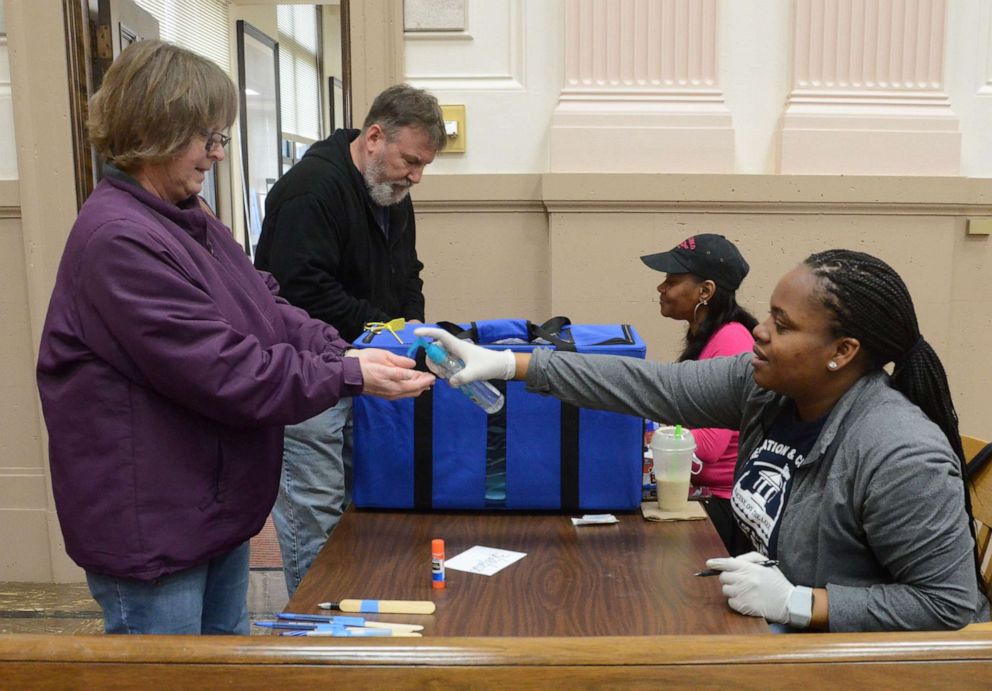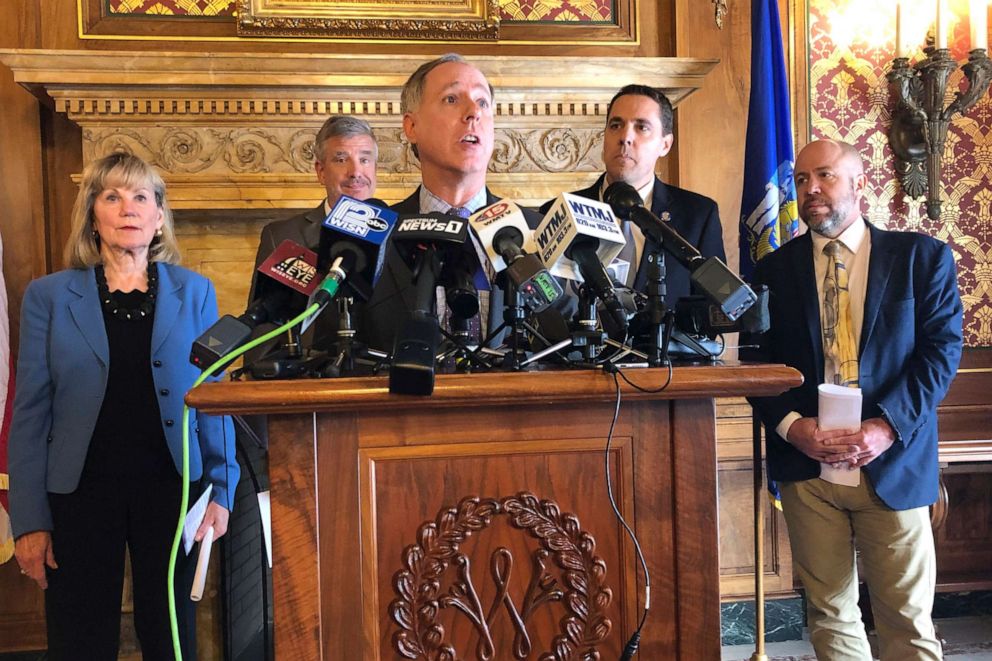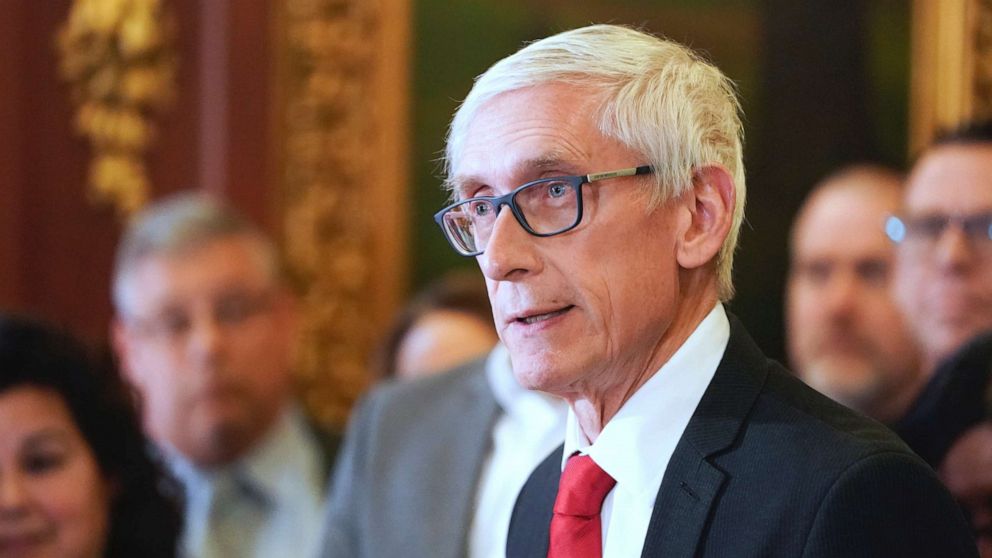Wisconsin Supreme Court blocks order by governor suspending in-person voting, putting Tuesday's election back on track
Wisconsin's spring election appears to be back on, after the state Supreme Court blocked an executive order from Gov. Tony Evers, which he issued earlier on Monday to suspend in-person voting on the eve of Tuesday's election, an eleventh hour move by the governor, who resisted taking unilateral action for weeks leading up to the contest.
The state Supreme Court overturned Evers' order in a 4-2 ruling, which came amid a dramatic turn of events in the state hours before polls open.
"The state’s highest court has spoken: the governor can’t unilaterally move the date of the election," a joint statement from Wisconsin House Speaker Robin Vos and state Senate Majority Leader Scott Fitzgerald said in response to the decision. "We continue to believe that citizens should be able to exercise their right to vote at the polls on Election Day, should they choose to do so...this election will proceed as planned."
Late Monday, Evers expressed concern about the impact of the ruling.
"People have bled, fought, and died for the right to vote in this country. But tomorrow in Wisconsin, thousands will wake up and have to choose between exercising their right to vote and staying healthy and safe," Evers said in a statement. "In this time of historic crisis, it is a shame that two branches of government in this state chose to pass the buck instead of taking responsibility for the health and safety of the people we were elected to serve."
Earlier Monday, Evers signaled this would be his last maneuver.
"This is it... this will be the last avenue that we're taking," he said at a press conference. "There is not a plan B, there's not a Plan C. We are moving ahead with this and we believe the Supreme Court will support us on this."
Evers' abrupt decision to call off in-person voting for the spring election by circumventing the legislature was the culmination of escalating tensions between the state's Democratic governor and the GOP-controlled state legislature.
"There’s no good answer to this problem—I wish it were easy. I have been asking everyone to do their part to help keep our families, our neighbors, and our communities safe, and I had hoped that the Legislature would do its part—just as the rest of us are—to help keep people healthy and safe," Evers said in a statement.
Evers' urgent order came just hours after lawmakers in both the state Senate and Assembly adjourned a special session until Wednesday without taking up any of the measures Evers previously asked to be considered, including delaying Tuesday's election, when he called the special session on Friday.

Less than an hour after Evers announced the emergency action, the chief executive faced a challenge from top Wisconsin Republicans.
"We are immediately challenging this executive order in the Wisconsin state Supreme Court," a joint statement from Vos and Fitzgerald said.
"The clerks of this state should stand ready to proceed with the election," the statement continues, likely injecting more confusion into the process as election officials are contending with conflicting guidance over how to proceed.
By the late afternoon, Republican lawmakers filed a motion with the Wisconsin Supreme Court seeking an emergency injunction to block Evers' order.
The state's chief election official, in a letter to local and clerks, who run polling sites across the state, urged volunteers and staff to proceed as planned amid the confusion over the status of the election.
"While the Governor has called for moving the election, we can be certain there will be very fast moving litigation," Meagan Wolfe, administrator for the Wisconsin Elections Commission, wrote in the letter. "We must continue to making preparation in earnest for tomorrow. If the election is moved to the 9th we will adjust accordingly, but all we can do today is prepare for tomorrow."
"I know too much has already been asked of you, but we ask you to proceed with your Election Day preparations as we do not know the outcome of any possible litigation and we need to be prepared if the election is held tomorrow," she added.
The decision by Evers came as the U.S. Supreme Court was also weighing a separate issue, in a case brought by national and state Republicans, who were seeking to stay a lower court's ruling extending the absentee ballot deadline to April 13.
In a 5-4 decision, the U.S. Supreme Court ruled that absentee ballots in Wisconsin be postmarked by April 7, overturning the six-day extension put in place by a lower court. Ballots can still be received by April 13, as long as they are postmarked by election day, to count.
"The District Court’s order granting a preliminary injunction is stayed to the extent it requires the State to count absentee ballots postmarked after April 7, 2020," the decision reads. "The question before the Court is a narrow, technical question about the absentee ballot process. In this Court, all agree that the deadline for the municipal clerks to receive absentee ballots has been extended from Tuesday, April 7, to Monday, April 13. That extension, which is not challenged in this Court, has afforded Wisconsin voters several extra days in which to mail their absentee ballots."
"The sole question before the Court is whether absentee ballots now must be mailed and postmarked by election day, Tuesday, April 7, as state law would necessarily require, or instead may be mailed and postmarked after election day, so long as they are received by Monday, April 13."
In dissenting opinion, Justice Ginsburg, joined by Justices Breyer, Sotomayor, and Kagan joining, wrote, "Under this Court’s order, tens of thousands of absentee voters, unlikely to receive their ballots in time to cast them, will be left quite literally without a vote."
"The majority of this Court declares that this case presents a 'narrow, technical question,'" she wrote. "That is wrong. The question here is whether tens of thousands of Wisconsin citizens can vote safely in the midst of a pandemic."
For weeks, mayors, Democrats and local election officials across the state -- and even Wolfe -- implored top leaders to make significant changes for the contest, as communities faced the stark reality of critical poll worker shortages -- falling short by up to 7,000 workers, as nearly 60% of Wisconsin municipalities reported a shortage of election volunteers.
"It's just distressing that Wisconsin did not learn from the Ohio experience, and that there is this 11th-hour scramble to try to address an issue that I think many of us have been trying to press for months now, as we watch the COVID-19 pandemic escalate in the country and in Wisconsin and in the city of Milwaukee," Neil Albrecht, the executive director for the city of Milwaukee Elections Commission, told ABC News.
Wisconsin was determined to forge on as planned since Tuesday's ballot features the presidential primary, as well as general elections for the state Supreme Court and a number of local races.
But some elections officials believe the governor took his "one chance" to avoid an in-person election, as the state remains under a stay-at-home order.
"I believe Gov. Evers did what he had to do," Mark Thomsen, a Democrat on the Wisconsin Elections Commission told ABC News. "Given the Republican leadership’s failure to have a meaningful special session, the governor had only one chance and one chance alone to save lives, recognizing there is a constitutional right to an election and allowing that to happen."
The shortages, have in turn, led to the consolidation of polling places, making social distancing all the more difficult to enforce. In Milwaukee, the state's largest city, there will only be five polling locations, a fraction of the 180 that are historically operating on election day, with local election officials saying turnout could be as high as four to 5,000 voters in each of the five sites on Tuesday.

Evers has repeatedly said he cannot changes the rules "on my own," saying that his "hands are tied" without the support from the state legislature.
Vos, pointing to Evers' own tweets from last week, also wrote on Twitter, "How can you say @GovEvers that you can't violate your oath less than a week ago and now literally flip-flop? We don't live in a banana republic where the executive can just cancel elections because he doesn't want to hold them."
In the executive order issued Monday justifying his action, Evers cited the Wisconsin Constitution, writing, "the Wisconsin Constitution establishes the purpose of State Government is to insure domestic tranquility and promote the general welfare, and, as Governor, I made an oath to uphold the Wisconsin Constitution."
In a briefing on the coronavirus on Monday, Evers elaborated on his sudden reversal, telling reporters that "circumstances have changed" after invoking U.S. Surgeon General Jerome Adams' warning to the country on "Fox News Sunday," when he said the crisis is worsening, calling it "our Pearl Harbor moment."
Wisconsin is contending with over 2,300 confirmed cases of COVID-19 and over 70 deaths.
"I cannot in good conscience stand by and do nothing. The bottom line is that I have an obligation to keep people safe," he said. "I've tried for weeks to meet Republicans in the middle to find common ground and figure out a Wisconsin solution, but at every turn, they fought all the way to the United States Supreme Court, even the most basic and common sense proposals to ensure a safe and fair election as outsourced to work folks, we've got to work together to keep people safe."
Evers, who said he spoke with both legislative leaders earlier in the day before issuing the order, acknowledged the tough legal road ahead but added, "most Wisconsins don't care about political fighting or battles that are going on in the courts. They're just scared right now. They want a governor of the state to stand up for them. And so that's what I'm doing."
The Democratic governor, who was elected in 2018, told reporters, "I believe the Supreme Court will be helpful," despite the state Supreme court favoring Republicans with a 5-2 conservative majority.
"There is a possibility we lose this case, I don't believe we will," he said.
"I'm not game playing here. The issue for me is the safety of the people of Wisconsin, as my constitutional reasoning for doing it," he added.
One of the justices on the state Supreme Court, Daniel Kelly, who is also on the ballot in Tuesday's election, weighed in on Evers' order, calling on the state to continue to proceed as planned as the order is challenged in court.
"From the very beginning of this campaign, all we have wanted is an election conducted according to the law. While the Governor’s order is being challenged in court, we urge clerks, poll workers, and voters to stand ready to conduct the election tomorrow," Kelly tweeted. "We can do two things at the same time: maintain the foundations of our democracy while taking reasonable precautions to keep people safe."
Kelly recused himself from the case Monday.
The executive order delays in-person voting until June 9, unless the governor and state legislature agree on a new alternative date - following suit with more than a dozen states that have postponed their contests until later this year due to concerns over coronavirus.
But whether Evers has the ability to go it alone to move the election, a debate he himself discounted up until this point, remained unclear as the case went before the state's highest court. Two experts told ABC News it would be very difficult for Evers to do so since that power mostly lies with the legislature.
"I do not think that he has the power to unilaterally delay the election," Rick Esenberg, president of the Wisconsin Institute for Law & Liberty, a conservative legal group, said in an email. "The Governor has broad emergency powers but they are subject to constitutional limitations. The impact on the right to vote would be severe given that local terms of office are expiring and many people have already voted."
"I believe that the only way an election date can be changed is if the legislature passes a bill and the Governor signs it into law. Even then, an election would have to be conducted in time to elect a Justice to the Supreme Court since the term of office of the incumbent cannot be extended by statute," he said. "Up to this point, though, neither the governor nor the legislature seems to want to postpone the election."
Another expert, Barry Burden, a political science professor and the Director of the Elections Research Center at the University of Wisconsin-Madison, said that while state law grants the governor sweeping emergency powers, many are "skeptical" it applies to the electoral process.
"Wisconsin state law does not explicitly allow the Governor to change the date of the election," he said. "The state constitution does grant the Governor some emergency powers, but many legal experts are skeptical that those powers extend to changing the dates or rules around elections."
"Governor Evers himself has said that the legislature needs to take responsibility for a safe and effective election. Just this afternoon he issued an order calling the state legislature into a special session this weekend, asking that they change the law to mail every registered voter a ballot and extending the period for casting those ballots into late May," Burden added.
ABC News' Meg Cunningham contributed to this report.




